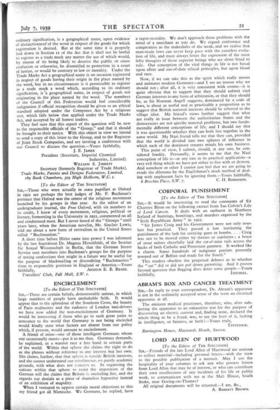ENCIRCLEMENT [To the Editor of THE SPECTATOR] SIR,—There are certain
beliefs, demonstrably untrue, in which large numbers of people have unshakable faith. It would appear that to the splendour of the Southern Cross, the beauty of Paris midinettes and the rudeness of London taxi-drivers we have now added the non-encirclement of Germany. It would be interesting if those who go to such great pains to announce to the world that Germany is not being encircled would kindly state what factors are absent from our policy which, if present, would amount to encirclement.
A friend of mine—one of those intelligent Germans whom one occasionally meets—put it to me thus. Germany demands, he explained, as a warrior race a free hand in certain parts of the world. Within that sphere she claims the right to do as she pleases without reference to any interest but her own. She claims, further, that that sphere is outside British interests, and she cannot understand our interference, on purely academic grounds, with what does not concern us. In organising the nations within that sphere to resist the imposition of the German will she claims that Britain i., encircling .her, and she regards our denials as a piece of shameless hypocrisy instead of an exhibition of stupidity.
When I ventured to oppose certain moral objections to this my friend got all Nietzsche. We Germans, he replied, have
a super-morality. We don't approach these problems with the mind of a merchant as you do. We regard conference and compromise as the makeshifts of the weak, and we realise that man-made laws can never keep pace with the ceaseless evolu- tion of life, and must always fetter the expression of the most lofty thoughts of those superior beings who are alone fitted to rule. Our conception of the vital things in life is not based upon effete and out-of-date ethical principles, but upon blood and race.
Now, if we can take this as the spirit which really moves and animates modern Germany—and I see no reason why we should not ; after all, it is very consistent with events—it is quite obvious that to suggest that they should submit vital German interests to any form of arbitration, or that they should be, as Sir Norman Angell suggests, dominated by a code of laws, is about as useful and as practicable a proposition as to suggest that British national interests should be referred to the village idiot. My friend's views further suggest that what are really in issue between the authoritarian States and the democracies are not specific material problems, but two funda- mentally different conceptions of life, and I should say that it was questionable whether they can both live together in the same world. My Nazi friend tells me that they can, provided that the world is divided into two spheres of influence in which each of the dominant tenants minds his own business.
This point of view, I submit, should, at any rate, be con- sidered frankly. Personally, it seems to me that the Nazi conception of life is—at any rate in its practical application—a very evil thing which we have got either to live with or destroy. And somehow or other I cannot just feel that we are going to evade the dilemma by the Englishman's stock method of deal- ing with unpleasant facts by ignoring them.—Yours faithfully,










































 Previous page
Previous page